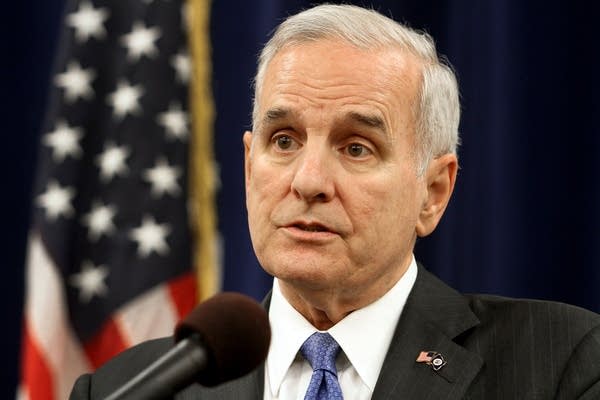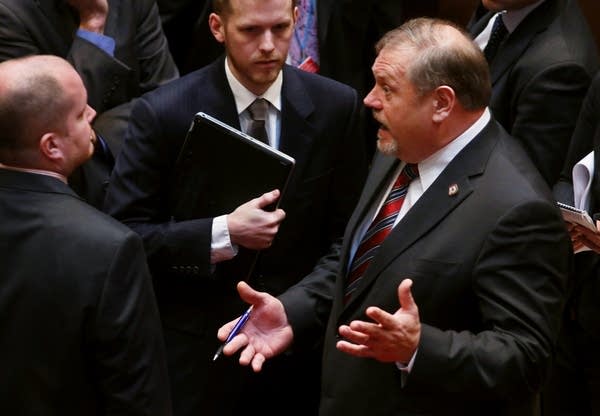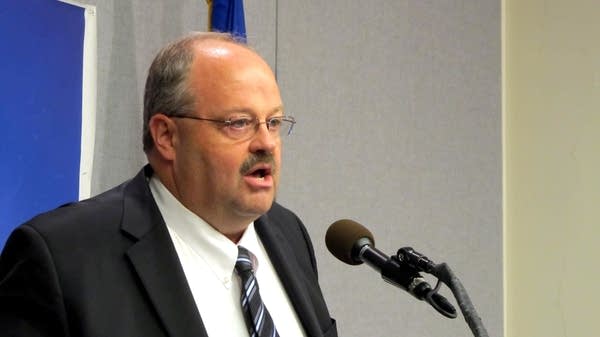Flush with $1 billion surplus, MN lawmakers eye targeted tax relief
Go Deeper.
Create an account or log in to save stories.
Like this?
Thanks for liking this story! We have added it to a list of your favorite stories.

A projected $1 billion budget surplus has many state lawmakers looking for ways to return some of that money to taxpayers. There are plenty of competing ideas for tax relief.
DFL Gov. Mark Dayton's already made it clear that child care tax credits are on his list.
Currently, about 38,000 families receive the credit. Dayton said he wants to lift the income eligibility to include 137,000 more families. He said the cost would be $175 million over two years.
"The state program is capped very low and phases out very quickly," Dayton said. "It really doesn't reach working middle-income, one- and two-parent families. Talk about tax reduction that benefits the middle class — that to me is probably one of the most significant things we can do."
Turn Up Your Support
MPR News helps you turn down the noise and build shared understanding. Turn up your support for this public resource and keep trusted journalism accessible to all.
Dayton won't get into the details of his budget plan until he unveils a proposal Jan. 27. But he's said he'll keep an open mind about other proposals for tax relief that could develop during the 2015 session.

Senate Majority Leader Tom Bakk, DFL-Cook, said he wants to see more specifics about the governor's child care proposal.
Bakk said the current credits work well for low-income families with little tax liability. But he said he thinks they become less valuable to people with higher incomes.
"As you move up and you have more and more tax liability, if you have the option with your employer to enter into a flex plan and put before-tax dollars away into a child care type account, that really is more beneficial than a state tax credit," Bakk said.
Bakk said tax reductions will compete with other spending proposals during the budget-writing session, and he said the final product won't satisfy everyone. He said he favors tax relief targeted to economic development in struggling areas of the state.
Unlike the income tax increase Democrats passed during the 2013 session to solve a projected budget deficit, Bakk said he sees no reason in 2015 to increase general fund taxes.
"We really kind of have the state's ship uprighted," he said. "Now, it's one of just trying to manage priorities moving forward."
Another big difference from 2013 is that Bakk and the DFL Senate have to reach a budget agreement with the tax-averse Republicans who now control the Minnesota House.

House tax committee chairman Greg Davids, R-Preston, said he'll make sure there aren't any increases.
"No more. We're not going to have a fifth income tax tier. We're going to try to hold the line," Davids said. "The one thing I can do is hold the line. The one thing I can do is stop the bleeding."
Before tackling new tax issues, Davids said his panel will act early in the session on language needed to keep state money flowing to Mayo Clinic's Destination Medical Center in Rochester.
Once that's done, Davids said he'd like to help businesses by phasing out the commercial property tax. He wants to discuss whether placing levy limits on local governments as a condition of state aid would hold down property taxes.
Davids also wants to revisit a law that allows school districts to increase levies without voter approval, but he's a realist when it comes to divided government.
"I realize that for several years here we're just not going to be able to do everything we want," he said. "What I'm looking for is: What can we agree on, what can we do to improve tax policy in Minnesota, and let's go forward and do it."


